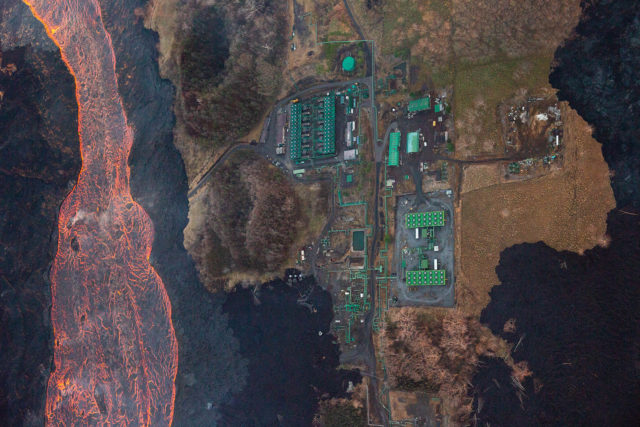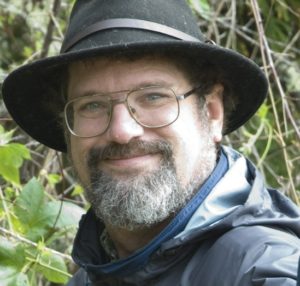Big Island: Opponents Will Try To Stop Geothermal Plant From Reopening
Even though the power facility damaged by last year’s lava flows is expected to be “operational” by year’s end, it’s facing challenges.
Puna Geothermal Venture, the troubled geothermal power facility shut down by last year鈥檚 lava flows, will be operational by the end of the year, according to the of its parent company, the Israeli corporation Ormat Industries.
But to some of the plant鈥檚 opponents, 鈥渙perational鈥� doesn鈥檛 mean it will be selling power.
PGV supplied about a quarter of Hawaii Island鈥檚 power until it was closed May 3. In the following weeks, lava flows surrounded the power plant, cutting power and water lines, covering three production wells and destroying the plant鈥檚 power substation as well as a warehouse and drilling equipment.
鈥淲ork is underway to resume operation of the plant,鈥� said Ormat CEO Isaac Angel in the report. 鈥淲e have constructed a new access road to the power plant, drilled a new fresh water well and started to open a production well. Initial tests from the geothermal injection wells indicate higher temperatures at the reservoir with no sign of any negative impact on pressure. In light of that, we currently estimate that we will be ready for operation by year end 2019.鈥�
No, it won鈥檛, said environmental activist Henry Curtis.

鈥淭here has to be a substation built, and that would require a PUC permit, and that permit will not be issued this year,” Curtis said. “There will be groups that will intervene in that proceeding.”
Those organizations, Curtis said, would include the , which has been fighting for more regulation of PGV for years, and the Oahu-based聽聽Curtis serves as vice president for governmental affairs for Puna Pono Alliance, and vice president for consumer issues for Life of the Land.
The latter group filed a public records request March 1 asking the state鈥檚 Department of Land and Natural Resources and Department of Health, the Public Utilities Commission and Hawaii County to find out what permits would be needed for the plant to come back online, Curtis said.
PGV 鈥渨ould have to have all its permits before it could sell electricity,鈥� he said.
Much of the opposition to the plant鈥檚 reopening stems from its聽toxic history with neighboring residents, some of whom say they have been covered with caustic soda from blowouts, subjected to jet-engine-level noise and hospitalized with hydrogen sulfide poisoning from the plant.

Now there are a lot fewer neighbors, thanks to the lava flows that wiped out the communities of Kalapana, Kaimu, Kapoho, Lanipuna Gardens and much of Leilani Estates. But according to Hawaii County Civil Defense Adminstrator Talmadge Magno, there are still homes within a quarter-mile of PGV property boundaries.
鈥淚f gas leaks, it still could pose a hazard,鈥� Magno said.
Bob Petricci, a Puna Pono Alliance member, said he sold his home near the plant at a $150,000 loss after he and his family repeatedly were forced to evacuate by hydrogen sulfide leaks.
鈥淚 think there are a lot of things that should be done before that happens,鈥� he said of the plant鈥檚 plans to reopen. He said he could see bright lights at that plant, for instance, that he believed should have been shielded, per EPA regulations to protect shearwaters, a type of seabird. He thought the changed topography of the new lava fields might be enough to require a new environmental impact statement.
But if the groups attempt to intervene, the state鈥檚 bureaucratic rules could work against them.
At the time of the plant鈥檚 shutdown, for instance, several groups and individuals, including Puna Pono Alliance, and the Pele Defense Fund, had already filed for a contested case hearing over the fact that the plant was running on an expired air quality permit from the health department.
The contested case process, Curtis said, had dragged on for two and a half years 鈥� and the permits only last five years.
鈥淎ccording to Department of Health鈥檚 Clean Air Branch, PGV鈥檚 air permit is still valid,鈥� wrote DOH spokesperson Janice Okubo in an email to Civil Beat.
鈥淚t is currently operating under a permit shield. Although the permit shows a 2014 expiration date, Hawaii Administrative Rules allows a permit to remain valid past the expiration date provided the permittee has submitted a complete renewal application a minimum of 60 days prior to the permit鈥檚 expiration date.鈥�

On Feb. 28, DOH Hearings Officer Steven Jacobson issued a ruling dismissing 鈥渁ll requests for a contested case hearing鈥� on the Clean Air Branch鈥檚 鈥渢entative and draft final renewals.鈥�
There could only be a contested case hearing on an actual renewal order, and since PGV apparently can operate indefinitely on its current permit if it files its renewal applications on time, there may never be an opportunity for a contested case hearing.
Jacobson’s ruling could be appealed in court.
Curtis said that the environmental and community groups could have聽 a number of reasons to intervene in the permitting process for the substation. The first could be health issues, such as hydrogen sulfide emissions from the plant. The second could be cost: Is PGV still more cost effective than other power sources such as solar and wind, whose prices have been dropping?
Another reason could be what Curtis called 鈥渞esilience.鈥� Hawaii Electric Light Co., he said, had been working on plans to compartmentalize energy production, dividing the island into districts or 鈥渃ells鈥� so if one cell went down, then the others would have enough power sources within each district to function independently.
But a reopened PGV could make its cell too reliant on one source, he said.
 GET IN-DEPTH
REPORTING ON HAWAII鈥橲 BIGGEST ISSUES
GET IN-DEPTH
REPORTING ON HAWAII鈥橲 BIGGEST ISSUES
We need your help.
Unfortunately, being named a聽finalist for a聽Pulitzer prize聽doesn’t make us immune to financial pressures. The fact is,聽our revenue hasn鈥檛 kept pace with our need to grow,听.
Civil Beat is a nonprofit, reader-supported newsroom based in 贬补飞补颈驶颈. We鈥檙e looking to build a more resilient, diverse and deeply impactful media landscape, and聽we hope you鈥檒l help by .
About the Author
-
 Alan D. McNarie has been covering the Big Island's people and issues for various publications for over a quarter century. He's published two novels: "Yeshua" and "The Soul Keys." He lives in Volcano. Email Alan at amcnarie@civilbeat.org
Alan D. McNarie has been covering the Big Island's people and issues for various publications for over a quarter century. He's published two novels: "Yeshua" and "The Soul Keys." He lives in Volcano. Email Alan at amcnarie@civilbeat.org


